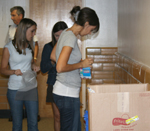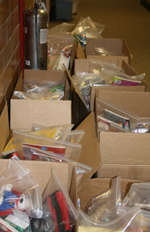|
Ron Nickel’s office in the College of Pharmacy was cluttered with boxes
and he couldn’t have been happier. It was Oct. 9 and he was sharing the
spirit of his students’ who were embarking on a mission to spread a
little holiday cheer in a place that sorely needs it—Haiti.
After painstaking hours of sorting and stuffing, the Christian
Pharmacists Fellowship International (CPFI) chapter at the South
Carolina College of Pharmacy’s (SSCP) MUSC campus had amassed more than
100 two-gallon bags filled with items to improve the health, hygiene
and spirit of children in the beleaguered country.
 Dr. Ron Nickel,
CPFI faculty advisor; Lauren Abel, (from left) third-year pharmacy
student; Lisa Murphy, first-year pharmacy student; and Liz McClintock,
third-year pharmacy student and president of CPFI, check out the boxes
packed for Haiti. Students and faculty of the College of Pharmacy as
well as other colleges at MUSC provided items such as toys, soap,
shampoo, clothes, rice, beans, multivitamins and school supplies
including pens, pencils, notepads and crayons. The students also
accepted cash donations from MUSC employees to purchase additional
items. The boxes were scheduled to be sent Oct. 16. Dr. Ron Nickel,
CPFI faculty advisor; Lauren Abel, (from left) third-year pharmacy
student; Lisa Murphy, first-year pharmacy student; and Liz McClintock,
third-year pharmacy student and president of CPFI, check out the boxes
packed for Haiti. Students and faculty of the College of Pharmacy as
well as other colleges at MUSC provided items such as toys, soap,
shampoo, clothes, rice, beans, multivitamins and school supplies
including pens, pencils, notepads and crayons. The students also
accepted cash donations from MUSC employees to purchase additional
items. The boxes were scheduled to be sent Oct. 16.
“Haiti needs a lot of help,” said Elizabeth McClintock, a third-year
SCCP student and CPFI president. “We can’t solve all their problems,
but we wanted to ensure that at least some of the children would get
something special around Christmas.”
The care bags of wash cloths, soap, rice, beans and other
necessities—along with a few fun items like stress balls—are sent in
boxes to Melbourne, Fla., where they join bags from other organizations
around the region, and are crated and shipped to Haiti. The outreach is
an initiative of Good Shepherd Ministries, which sponsors the
elementary schools in northern Haiti where the bags eventually are
delivered.
CPFI’s goal every year is to get the bags to the children by Dec. 25,
but the wheels of the Haitian government can be slow. One year the bags
didn’t reach their destinations until March.
Haiti is the poorest country in the Western Hemisphere, and is often
plagued by social violence and natural disasters. Most of its nearly 4
million children under the age of 14 live in poverty, and are without
adequate shelter, food, clothing and potable water. Poor hygiene and
micronutrient malnutrition are significant contributing factors in the
poor health of these people.
 One hundred boxes
were filled with items to go to children in Haiti. One hundred boxes
were filled with items to go to children in Haiti.
Three years ago, the CPFI chapter at MUSC decided to try to help. At
first, the pharmacy students focused on hygiene and sent bags with wash
cloths, shampoo, soap, combs, brushes and other personal health items.
Last year, they began adding cups of beans and rice to each bag. They
also try to include something playful like stress balls or notepads
with pens, items usually left behind by pharmaceutical company reps.
This year they added vitamin supplements and freeze-dried food.
“The cost of food is two, three times what it costs here,” said Nickel,
associate professor of clinical pharmacy and outcomes sciences and
associate director of continuing education. “The income is extremely
low. So the people supplement their diets with the mangoes, bananas and
other fruits that grow there naturally. Unfortunately, these recent
hurricanes stripped the trees of their fruit. So we’ve added some
vitamins and other things to help.”
While Nickel searches for discounts and sales for purchases, most of
the items in the bags are secured either by in-kind donations or by
money raised through collection boxes around campus, student projects
or solicitations of faculty and staff.
The group realized that special attention was required in packing the
vitamins, because they looked a little like candy. So warning labels
needed to be created to prevent overuse and waste, but the warning
labels needed to be easily understood by the Haitians. This meant
finding someone fluent in Creole.
Enter Jean Hilaire.
Jean Hilaire, a third-year pharmacy student, hails from Haiti. A 1990
graduate of Tertulien Leclerc High School in Port-Au-Prince, Hilaire
conducted his pre-pharmacy work at Broward Community College and Miami
Dade College in South Florida. He earned a degree in linguistics from
the University of Haiti and was working towards a master’s degree in
pharmaceutical sciences at Campbell University in North Carolina before
enrolling in the first fully united SCCP class in 2006.
Hilaire served as the linguistic expert, translating the warning label
information into Creole, which was included in each bag.
“I’ve seen first-hand the struggles of some of the people in Haiti,” he
said. “What we’re sending them is more than just a toy at Christmas or
food for a few days; what we’re sending them is the message that people
know and care about what happens to them.”
Friday, Oct. 17, 2008
|



